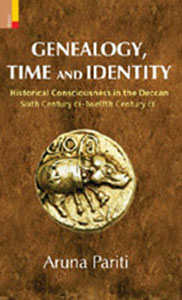
Genealogy, Time and Identity
Historical Consciousness in the Deccan, Sixth Century CE-Twelfth Century CE
AUTHOR – Aruna Pariti
| HB ₹1395 .$ 64.95 . ₤ 42.95 |
||
INFORMATION
- AUTHOR : Aruna Pariti
- HB ISBN : 978-93-84082-47-3
- Year : 2015
- Extent : xiii + 352 pp.
- Discount available on checkout
- Usually dispatched within 3 to 5 working days.

Genealogy, Time and Identity
| HB ₹ 1395 . $ . ₤ |
PB ₹ . $ . ₤ |
|
| POD ₹ . $ . ₤ |
e-Book ₹ . $ . ₤ |
INFORMATION
- AUTHOR – Aruna Pariti
- ISBN – 978-93-84082-47-3
- Year – 2015
- Extent: 400 + 40 coloured illustrations
- 10% discount + free shipping
- Usually dispatched within 3 to 5 working days.
Genealogy, Time and Identity provides, for the first time, a detailed analysis of the prasasti and donative parts of the inscriptional records of different Chalukyan families that ruled the Deccan between 600 and 1200 CE. Genealogies are studied not merely as a representation of royalty but also to understand the historical processes of identity constructions which constantly changed in time and space. This study is interesting because it has shifted focus away from the genre of writing regional political history to the genre of writing social history at the regional level using the same genealogical sources more effectively. Through the fourfold classification of the inscriptions spread across time and space, and inclusion of some of the families of local chiefs, it has also addressed issues relating to the use of time in its varied dimensions – cyclic or mythical, linear or historical. The main argument in this book also tries to disprove the theory that pre-colonial India had absence of historical consciousness. Since every individual, family and nation has a past, the study of genealogies as records of the past helps us to understand how ruling families viewed their past, which was based on both memory and time.
The Author
Aruna Pariti is an Assistant Professor with the Department of History, Nizam College, Osmania University, Hyderabad. She is also the author of State Formation in the Eastern Deccan (7th Century AD – 13th Century AD).
Genealogy, Time and Identity provides, for the first time, a detailed analysis of the prasasti and donative parts of the inscriptional records of different Chalukyan families that ruled the Deccan between 600 and 1200 CE. Genealogies are studied not merely as a representation of royalty but also to understand the historical processes of identity constructions which constantly changed in time and space. This study is interesting because it has shifted focus away from the genre of writing regional political history to the genre of writing social history at the regional level using the same genealogical sources more effectively. Through the fourfold classification of the inscriptions spread across time and space, and inclusion of some of the families of local chiefs, it has also addressed issues relating to the use of time in its varied dimensions – cyclic or mythical, linear or historical. The main argument in this book also tries to disprove the theory that pre-colonial India had absence of historical consciousness. Since every individual, family and nation has a past, the study of genealogies as records of the past helps us to understand how ruling families viewed their past, which was based on both memory and time.
The Author
Aruna Pariti is an Assistant Professor with the Department of History, Nizam College, Osmania University, Hyderabad. She is also the author of State Formation in the Eastern Deccan (7th Century AD – 13th Century AD).
Table of Contents
Table of Contents
| Preface | Ix-X |
| Abbreviations | Xi-Xi |
| List Of Maps And Appendices | Xiii |
| Introduction | 1-27 |
| Trends In Modern Historiography | 28-60 |
| Genealogy, Time And Identity | 61-103 |
| Conquests, Migrations And Spatial Expansion | 104-15 |
| Patronage, Economic And Social Control | 156-214 |
| Ideology, Region And Pan-Indian Linkages | 215-264 |
| Recapitulation And Conclusion | 265-286 |
| Appendices | 287-308 |
| Bibliography | 309-329 |
| Index | 331-338 |




